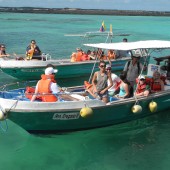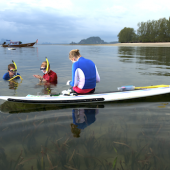This case study shares a unique educational experience that combined sustainability and design education with international partnerships that sought to investigate and visually analyze relationships between housing design and water infrastructure in both Pittsburgh, PA (USA) and urban centers of Indonesia. This project built upon an existing foundation of international relationships between faculty and institutions within a consortium framework. The project used a pre-course and a faculty-led student trip to establish relationships among faculty and students based in the United States (US) and Indonesia and to determine preliminary shared research goals to be built upon for future research collaborations that can attain a deeper and longer-term relationship. Students who participated in these courses refined their visual communication skills, gained a valuable global perspective on urban water management, were exposed to participatory photography as a research tool, and were strongly affected by their cultural experiences in Indonesia. Peer work between US and Indonesian students provided opportunities for students to exchange ideas and perceptions about the observed environment, which are influenced by their familiarity and unfamiliarity with the setting. The experience of this project can serve as a primer for the sustainability educator who is interested in interdisciplinary and international educational endeavors.
Continue Reading
The field study (or short-term study abroad) creates a successful hybrid of study abroad and field research. These short-term educational adventures (edu-ventures) give environmental or sustainability students opportunities to gain practical knowledge while traveling domestically or overseas. In addition, it presents the opportunity for both faculty and students to extend the traditional Boyer model of scholarship, a reputable professoriate model, by developing continuity. The field study fulfills the four pedagogical goals of the Boyer model: creating research opportunities (discovery); breaking down the silos of traditional academic departments (integration); acting as consultants on-site (application); and educating students beyond the faculty members’ expertise (teaching). In addition, these field studies fulfill a fifth goal: building relationships and transgressing time (continuity). The development of this Boyer Plus model from a field-study experience serves as a tremendous tool for colleges, universities and professors to build the opportunities and necessary pedagogical skills for both traditional and non-traditional students.
Continue Reading
Joe Treaster showcases an intense experiential learning course using audio recordings to create original student work in the Galapagos Islands. he makes the strong case for the transformative nature of study-abroad experiences when students are challenged to be directly involved in the communities and locations where they go to study.
Continue Reading
Understanding how we live (culture) and its impact on where we live (ecology) is one of the key issues facing sustainability and sustainability education. The International Sustainable Development Studies has developed a study abroad program for American college and university students in Thailand, “People, Ecology and Development” to address these issues through experiential studies of sustainability. Courses each semester focus on understanding the broader challenges of sustainable development through experiential studies of specific landscapes and cultures in the villages, mountains, coasts and islands throughout Thailand. This paper examines the key components of ISDSI’s programs, and provides a framework for understanding how these principles can be used to teach about sustainability within the broader context of issues of social justice and global learning more generally. Key components of the ISDSI approach include: community based learning — working with local communities to design courses that reflect community needs, knowledge and struggles; place-based learning — examining both the culture and ecology of specific locations, watersheds, bioregions, island archipelagos, etc.; experiential learning — learning through direct examination of and participation in the cultural practices (lifeways, norms, etc.) and study of ecological components (forests, coral reefs, etc.); and expedition based — learning during focused expeditions through the landscapes being studied, usually human powered (backpacking through remote mountain forests, sea kayaking between islands, etc.).
Continue Reading